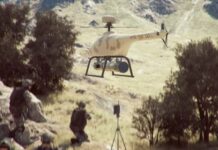With a squad of 14 robots that worked together autonomously in a complicated mapping exercise, a team from the University of Michigan has won the inaugural Multi Autonomous Ground-robotic International Challenge (MAGIC 2010) in Australia. MAGIC 2010 featured some of the world’s most ground-breaking robotics technologies as the teams deployed a total of 43 robots to navigate a 250,000 square-meter indoor and outdoor course over three-and-a-half hours. Teams were judged on a number of factors including the maps they produced and the time they took to complete three increasingly complex challenge phases. Teams were penalized for the amount of time they manipulated their robots manually. The announcement of the winning team was made during the Land Warfare Conference taking place in Brisbane, Australia this week.


“Behind Team Michigan’s robots was an amazing group of students who spent countless hours building, programming and testing the entire team of robots – and they also dealt with the formidable logistical challenges of putting everything together and shipping it 10,000 miles away,” explained Assistant Professor Edwin Olson, team lead from the Electrical Engineering and Computer Science Department at the University of Michigan. “MAGIC 2010 gave us a chance to show that our research translates to the real world.”
A joint initiative of Australia’s Defence Science and Technology Organisation (DSTO) and the U.S. Army Research, Development and Engineering Command’s Tank Automotive Research Development and Engineering Center (TARDEC), MAGIC 2010 spanned more than two years with a stated goal of furthering the development of robot teams that could operate autonomously in dangerous situations, keeping Soldiers out of harm’s way.
Five teams from the United States, Turkey and Australia were selected by the U.S. and Australian defense departments after a two-phase down select to compete in an effort to develop the next generation of fully-autonomous ground robots. Team Michigan and partner SoarTech (Ann Arbor, Mich.) earned a grant of $750,000 (USD). A team from the University of Pennsylvania (Philadelphia) came second and the third place was won by another U.S. group – ”Team Reconnaissance and Autonomy for Small Robots’ – RASR – from Gaithersburg, Md. Rounding out the top five teams were teams Cappadocia (Ankara, Turkey) and MAGICian (Perth, Australia).


















